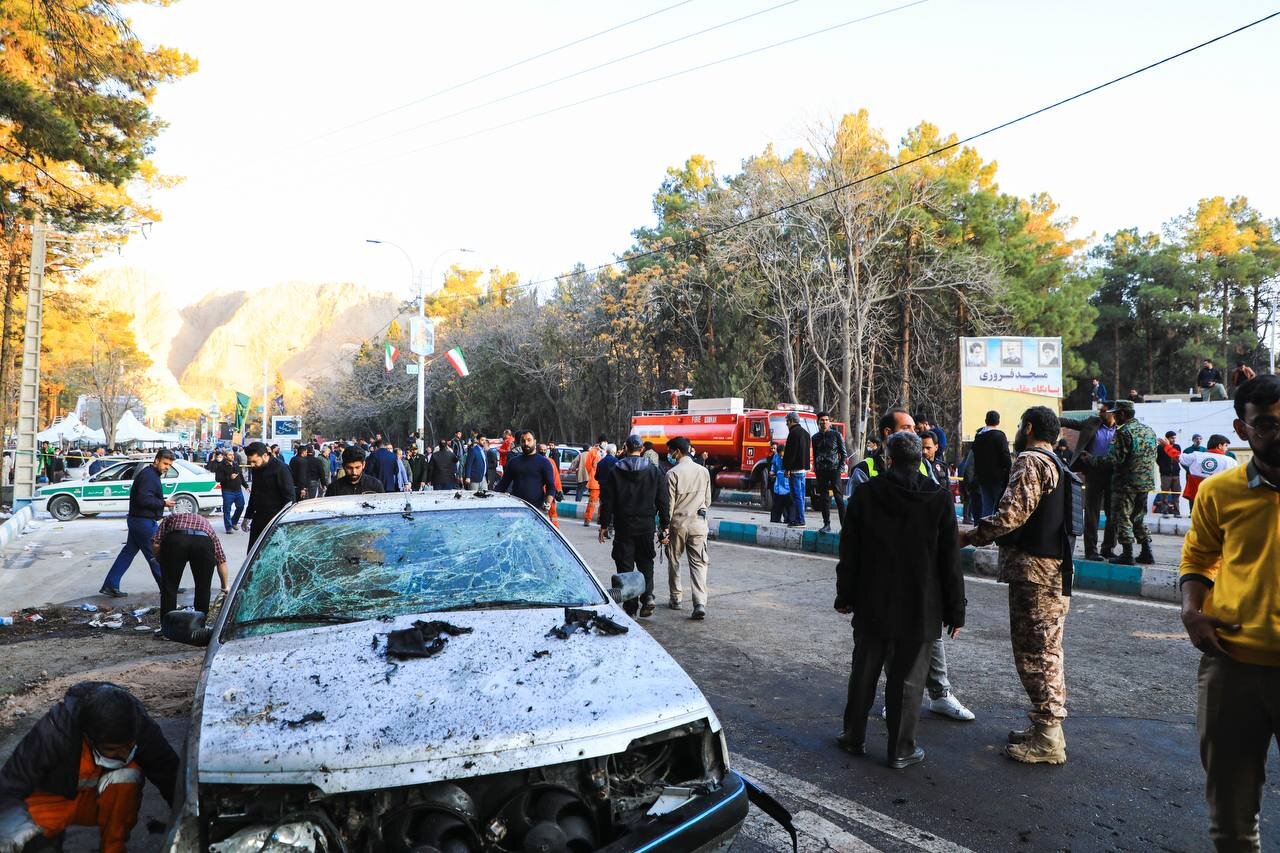Losing in Gaza, massacring civilians in Kerman

TEHRAN - Israel razed Gaza to the ground, induced famine in the enclave, and even killed its own hostages while trying to take revenge for its egregious defeat on October 7. However, despite the loss of over 22,000 Palestinian lives, Israel's thirst for violence remains unquenched, prompting the regime to seek out new victims.
And what better place to initiate a fresh wave of bloodshed than the birthplace of the mastermind behind the Axis of Resistance?
Despite the passage of four years since his tragic departure, the enduring gratitude and sense of indebtedness to General Qassem Soleimani persist among the people. This sentiment was strikingly evident on January 3, as throngs of Iranians gathered at the cemetery where he was laid to rest, marking the day of his assassination during a U.S. drone attack in 2020. People embarked on a journey spanning tens of kilometers and saw it as a small gesture to honor the man who had dedicated his life to their well-being. However, as more mourners arrived at his tomb, two powerful explosions tore through the area in quick succession.
The aftermath of the explosions was reminiscent of the harrowing scenes coming out of Gaza, with men, women, and children lying in their blood as their family members cried out in horror beside them. Others watched in disbelief as emergency forces rushed to transport the wounded to the hospital.
The explosions have been confirmed as terrorist attacks, resulting in a staggering toll of 84 individuals who lost their lives and over 284 people sustaining injuries.
Within an hour after the attacks, accounts associated with the Israeli regime began to rejoice at the loss of lives on X. “People found a creative way to celebrate his assassination,” callously wrote Hananya Naftali, an Israeli living in the occupied territories who previously announced he was taking part in the regime’s ground offensive in Gaza, by posting a picture of himself in military attire.
Yossi Cohen, the former head of Mossad, reacted to the tragic attacks by stating that “A cold and dry winter” lay ahead of Iran. Another account associated with Mossad also seemed to confirm Israel’s involvement in the terrorist act claiming that “Israel does not strike just for the sake of striking, but only for the purpose of thwarting a threat”.
Why were civilians targeted near Gen. Soleimani’s burial site?
It's no secret that Israel suffered a significant military, security, and intelligence setback at the hands of Hamas resistance forces on October 7. In an abrupt attempt to recuperate from this substantial defeat, the regime initiated unprecedented attacks on the Gaza Strip and exacerbated the plight of its 2.3 million inhabitants by depriving them of basic necessities such as food, water, and medication.
While the regime's inability to anticipate the highly skilled operation conducted by Hamas in the occupied territories was evident, its assessment of its own military capabilities—or lack thereof—proved to be equally flawed. Despite more than three months of conflict in Gaza, the regime has failed to dismantle any of Hamas's strongholds, all the while enduring thousands of casualties. Concurrently, global sentiment towards the regime is souring, with increasing calls from Western populations for their governments to cease funding Israel's lethal campaign in Gaza.
The terrorist attack near the burial site of General Soleimani on Wednesday appears to serve two aims for Israel. Firstly, it could potentially serve as a means to compensate for the series of setbacks experienced on the Gaza battleground, as per its own estimations. Secondly, it may be viewed as an opportunity to once again take revenge on General Soleimani for his instrumental role in fostering and bolstering resistance movements.
Israel's perspective on this matter is marked by the belief that the focal point of the resistance lies in Tehran, effectively positioning it as the "head of the snake".
Reluctant to acknowledge its defeat at the hands of Palestinians who have endured a grueling 16-year-long blockade, the regime clings to a narrative that portrays the Palestinian population as uncivilized, technologically inept "human-animals." This implies that, in their perspective, the dismantling of Israel's facade of invincibility must be orchestrated by a more significant power—always seen as Iran.
While Palestinians have received aid from Iran over the past 40 years, it is the steadfast resolve and unwavering determination of the Palestinian populace itself that will ultimately serve as the primary catalyst leading to the eventual downfall of the Israeli apartheid regime. Israel might experience fleeting satisfaction at the notion that a supporter of the Palestinian cause must grieve the loss of its civilians. But in the grander scheme of events unfolding on the Gaza battleground, the Wednesday terrorist attack is unlikely to yield a significant impact.
Gen. Soleimani here to stay
When asked about the terrorist attack near his father's burial site, General Soleimani's son expressed: “They are even afraid of those visiting his burial site”. These words succinctly illustrate the depth of fear and animosity the military leader has instilled within Israel's political spheres. Even four years after his passing, the general's presence continues to loom over Israelis in Gaza, Lebanon, Yemen, Syria, Iraq, and even within the occupied territories.
The latest terrorist incident was meant to prevent people from resonating with General Soleimani. Israel wants people to think that even trying to pay homage to the slain figure, will put their lives in danger. What Israel once again failed to take into account is that Iranians always demonstrate a pattern of growing stronger in the aftermath of adversity.
Orchestrating a massacre near the burial site of General Soleimani will not sap his popularity, it will only stoke fiercer retaliation. It will nourish the tree of resistance within Iran and globally, garnering increased resonance for General Soleimani’s principles and beliefs.
By Mona Hojat Ansari
Leave a Comment